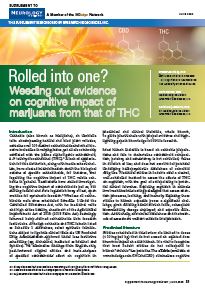User login

This supplement to Neurology Reviews summarizes summarize findings from English-only, peer-reviewed original articles and meta-analyses of specified cannabinoids’ effect on cognition in preclinical and clinical literature, where known, to guide practitioners with proper evidence and highlighting gaps in knowledge for future research.
Click here to read the supplement.
Authors
Francesca Filbey, PhD
Bert Moore Chair and Professor
of Cognition and Neuroscience
The University of Texas at Dallas
Chris Hauser, PhD
Medical Science Liaison
Greenwich Biosciences, Inc.
Karthik Rajasekaran, PhD
Sr. Medical Science Liaison
Greenwich Biosciences, Inc.
1. Mead A. Front Plant Sci. 2019;10:697.

This supplement to Neurology Reviews summarizes summarize findings from English-only, peer-reviewed original articles and meta-analyses of specified cannabinoids’ effect on cognition in preclinical and clinical literature, where known, to guide practitioners with proper evidence and highlighting gaps in knowledge for future research.
Click here to read the supplement.
Authors
Francesca Filbey, PhD
Bert Moore Chair and Professor
of Cognition and Neuroscience
The University of Texas at Dallas
Chris Hauser, PhD
Medical Science Liaison
Greenwich Biosciences, Inc.
Karthik Rajasekaran, PhD
Sr. Medical Science Liaison
Greenwich Biosciences, Inc.
1. Mead A. Front Plant Sci. 2019;10:697.

This supplement to Neurology Reviews summarizes summarize findings from English-only, peer-reviewed original articles and meta-analyses of specified cannabinoids’ effect on cognition in preclinical and clinical literature, where known, to guide practitioners with proper evidence and highlighting gaps in knowledge for future research.
Click here to read the supplement.
Authors
Francesca Filbey, PhD
Bert Moore Chair and Professor
of Cognition and Neuroscience
The University of Texas at Dallas
Chris Hauser, PhD
Medical Science Liaison
Greenwich Biosciences, Inc.
Karthik Rajasekaran, PhD
Sr. Medical Science Liaison
Greenwich Biosciences, Inc.
1. Mead A. Front Plant Sci. 2019;10:697.